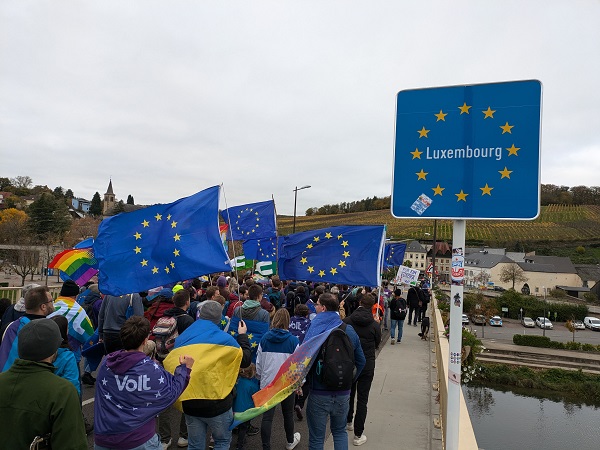 "Don't Touch My Schengen" protest, arrival in Schengen, Luxembourg, 2 November 2024;
"Don't Touch My Schengen" protest, arrival in Schengen, Luxembourg, 2 November 2024;
A pro-European, cross-border protest against national border controls took place on Saturday 2 November 2024.
As reported by the pro-European groups involved in the protest, people from Belgium, France, Germany, Luxembourg and the Netherlands came together on Saturday to demonstrate against the newly introduced border controls at Europe's internal borders, with a march from France via Germany to Schengen in Luxembourg.
The march was supported by a broad coalition of parties and civil society: Volt, the Young European Federalists (JEF), the Europäische Bewegung Saarland, the Europa-Union, Pulse of Europe, the Piratenpartei Rheinland-Pfalz and the Party of Humanists (PdH)). A total of 250 people reportedly took part in the demonstration.
In a series of speeches, the groups emphasised that border controls are not a solution to the challenges of European migration policy and criticised the "increasing populist, nationalist rhetoric". On the contrary, they argued that the "bogus" solution threatens one of the most important symbols of European unification.
"We are here to protect the principles of the European Union. We want to expose the right-wing narratives that have become mainstream positions and we want to show that the idea of open borders and a united Europe is the reason for our success," said MEP Kai Tegethoff (Volt), summarising the aim of the march. The groups agreed that the challenges of migration and integration policy could only be overcome sustainably with a joint European approach.
Sharp criticism of the German government came from JEF Federal Chairwoman Melanie Thut: "Germany is taking an axe to a cornerstone of European integration. Germany is violating European law, the Schengen Borders Code. And its own promises: Where is it, the federal Europe from the coalition agreement that we as JEF fought so hard for?"
The groups involved added that, according to the Schengen Borders Code, border controls are only permitted "in exceptional circumstances" as a "last resort" and with a clearly defined reason. They argued that the blanket orders issued by Germany, France and the Netherlands do not fulfil this requirement; they affect everyone, especially people who live close to the border, but also travellers, commuters, international students and trainees are noticeably restricted in their everyday lives and freedom. They also result in economic losses due to more difficult border traffic, they argued.
The groups' demands were summed up by Christelle Savall, President of JEF Europe: "We need a single, common response from the whole of Europe, European solutions to European problems decided in co-operation the immediate and unrestricted restoration of freedom of movement within the Schengen area for all, including by land for Bulgaria and Romania, the enforcement of freedom of movement by the EU institutions."
Philippe Schannes, co-chair of Volt Luxembourg, emphasised the importance of the Schengen Agreement for Luxembourg: "Open borders have made our country what we are today. Luxembourg represents Europe, relies on Europe and we, as Volt Luxembourg, will always defend the European freedom of movement. At a time when divisions fuelled by populism are threatening to undermine the very foundations of our Union, it is our duty to uphold the European idea of unity and cooperation. We must stand together for a Europe without borders, for a Europe of peace, prosperity, freedom and progress."








